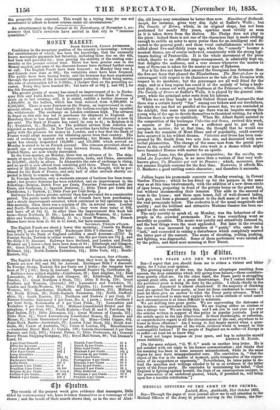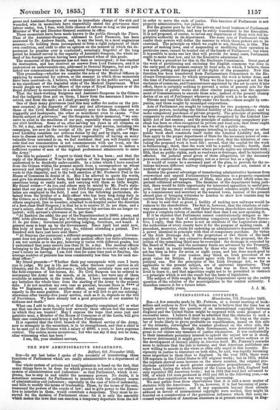MEDICAL OFFICERS OF THE ARMY IN THE CRIMEA.. Zesketh How,
Ambleside, 31st October 1865. Six—Through the pages of your journal allow me to call attention to the Medical Officers of the Army at present serving in the Crimea, the Sur-
geons and Assistant-Surgeons of corps in immediate charge of the sick and wounded, who in memorials have respectfully stated the grievances they labour under, but, I fear, with little chance of redress so long as the present Minister of War and Director-General continue in office.
These memorials have been made known to the public through the Times. That of the Assistant-Surgeons, addressed to Lord Panmure, has been answered by Dr. Andrew Smith, and, to say the least, in a most ungracious manner,—he holding them incompetent to form a right judgment of their own condition, and unfit to offer an opinion on the manner in which the de- partment he presides over is conducted; seemingly forgetful of the long period he himself served in the capacity of Assistant-Surgeon, the whole in- deed of his foreign service having been performed when of this grade.
The memorial of the Surgeons has not been so intercepted; it has reached its destination, and has received an answer from Lord Panmure, and it is understood an unfavourable one, addressed to General Simpson, but not pub- lished nor communicated to the Regimental Surgeons who made it. This proceeding—whether we consider the acts of the Medical Officers in applying by memorial for redress, or the manner in which those memorials have been received—is, I believe, without parallel in the public service, and is too significant of the degraded state of the Medical Department. What would people say were the officers of the corps of Royal Engineers or of the Royal Artillery to memoralize in a similar manner ?
That the hard-working Surgeons and Assistant-Surgeons in the Crimea feel the indignity thus put on them, I know from the assurance I have re- ceived, and from the spot ; as I shall presently show. One of their many grievances (and this may suffice for notice on the pre- sent occasion) is the disparity of their pay and allowances compared with those of the Civil Medical Officers recently sent to the East,—the one so niggardly and inadequate, the other so munificent even to excess. " Our fourth subject of grievance," say the Surgeons in their memorial, "we con- ceive to exist in the smallness of our pay, especially when contrasted with our civil brethren. Some of us, after serving ten years in all climates on 7s. 6d. a day, and after twelve or thirteen years' total service, including two campaigns, are now in the receipt of 13s. per day." They add—" When your Lordship considers our arduous duties by day and by night, our expo- sure to disease and battle, and the heavy responsibility of having so many valuable lives intrusted to us, we feel confident that you will frankly con- cede that our remuneration is not commensurate with our trust, nor the position we are expected to maintain ; neither is it calculated to induce a sufficient number of men of the highest professional attainments to enter the Army." Can this be gainsaid ? I regret to think that it has been ; and that the reply of the Minister of War to this portion of the Surgeons' memorial is understood to be decidedly unfavourable. In a letter which I have received from the Crimea within the present month from a correspondent on whose accuracy and integrity I can rely—a Regimental Surgeon—he specially ad- verts to this disparity, and to the bold assertion of Mr. Frederick Peel in the House of Commons in denial of it. May I be allowed to quote his words, and give his statements of facts, that the matter may be made clear ? general assertions being so easily made, and carrying with them so little weight. My friend writes—" As you and others may be misled by Mr. Peel's state- ment that our pay is equivalent to the Civil Surgeons, and that none of the latter are employed in the field, I send you the following particulars, ob- tained from the brother of a field-officer who has been long doing duty in the Crimea as a Civil Surgeon. His agreement, he tells me, and that of the others employed, (ten in number, attached to an hospital under the direction of a first-class Staff Surgeon,) is that he is to receive 21. 2s. per diem, and a year's salary, clear of all deductions, whenever his services are no longer re- quired; with servant's allowance of 3s. per diem."
"At Rankeoi (he adds) the pay of the Superintendent is 20001. a year, and 6001. table allowance. The pay of the twenty-four medical men attached is 1/. 5s. per diem ; Government providing lodging, furniture, and board. A general mess is kept up by the Government. Since April last until now, this body of men has received pay, &c. without attending a patient. Two hundred sick have just been sent there." "At Smyrna (he continues) a different arrangement holds good. Govern- ment does not provide a table ; but each medical officer has table-allowance. I am not certam as to the pay, believing it varies with different grades, but I understand that none receive leas than 21. 2s. a day. The medical officers belonging to the Hospitals at Smyrna and Rankeoi are to receive only a half- year's salary on leaving. I am told that for some time past at Smyrna, the average number of patients has been considerably less than ten for each me- dical officer."
My friend proceeds—" Whether their pay corresponds with ours I leave you to judge. My pay is 13s. per diem, after thirteen years' service in all climates, and 2s. 6d. field-allowance ; which latter certainly does not cover the field-expenses of bat-horses, &c. No Civil Surgeon can be ordered to accompany the Army on the march, or in action; nor were any of them available as assistants in the trench duties. I have remained in charge of ray battalion the whole time from the starting of the Army to the present date. I do not mention my own case as peculiar, because there is 41*** of the ** Regiment, a most excellent officer, and many others I dare say, exactly in the same position. How many of us will live to get our retiring- allowance after twenty-five years' service, such as it is, depends on the will of Providence. We have already lost a good proportion of our number by sickness and death."
What can I add to this, in proof of that disparity complained of ? or what say that can show more forcibly how severely these officers feel the manner in which they are treated ! May I express the hope that some just and patriotic man, a Member of the House of Commons or of the Lords, will give their case consideration and bring it before Parliament.
It is reported that the Civil branch of the Medical service of the Army, now so strangely in the ascendant, is to be strengthened, and that a chief is to be sent out to the Crimea with a salary of 40001. a year, to have supreme control. The notion seems monstrous; but who can say it may not be done, after witnessing what has been ?



























 Previous page
Previous page